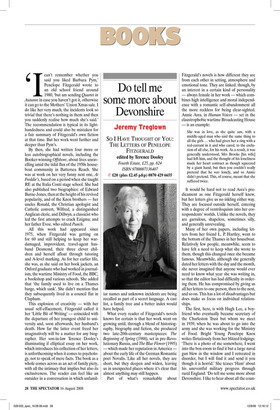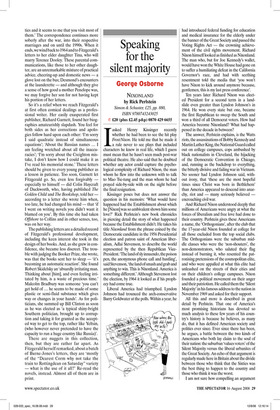Do tell me some more about Devonshire
Jeremy Treglown
SO I HAVE THOUGHT OF YOU: THE LETTERS OF PENELOPE FITZGERALD edited by Terence Dooley Fourth Estate, £25, pp. 624 ISBN 9780007136407 ✆ £20 (plus £2.45 p&p) 0870 429 6655 ‘I can’t remember whether you said you liked Barbara Pym,’ Penelope Fitzgerald wrote to an old school friend around 1980, ‘but am sending Quartet in Autumn in case you haven’t got it, otherwise it can go to the Mothers’ Union Xmas sale. I do like her very much, the incidents look so trivial that there’s nothing in them and then you suddenly realise how much she’s said.’ The recommendation is typical in its lighthandedness and could also be mistaken for a fair summary of Fitzgerald’s own fiction at that time. But her work went further and deeper than Pym’s.
By then, she had written four more or less autobiographical novels, including the Booker-winning Offshore, about lives unravelling amid the tidal flux of the 1950s houseboat community in Battersea Reach. She was at work on her very funny next one, At Freddie’s, based on a period when she taught RE at the Italia Conti stage school. She had also published two biographies: of Edward Burne-Jones, then at the height of his revived popularity, and of the Knox brothers — her uncles Ronald, the Christian apologist and Catholic convert, Wilfred, a distinguished Anglican cleric, and Dillwyn, a classicist who led the first attempts to crack Enigma; and her father Evoe, who edited Punch.
All this work had appeared since 1975, when Fitzgerald was getting on for 60 and still helping to keep her wardamaged, improvident, travel-agent husband Desmond, their three clever children and herself afloat through tutoring and A-level marking. As for her earlier life, she was, as she said on her book jackets, an Oxford graduate who had worked in journalism, the wartime Ministry of Food, the BBC, a bookshop and various schools. She added that ‘the family used to live on a Thames barge, which sank’. She didn’t mention that they subsequently lived in a council flat in Clapham.
This explosion of creativity — with her usual self-effacement, Fitzgerald called it her ‘Little Bit of Writing’ — coincided with the departure of her youngest child to university and, soon afterwards, her husband’s death. How far the latter event freed her imaginatively will be a matter for any biographer. Her son-in-law Terence Dooley’s illuminating if elliptical essay on her work, which introduces his collection of her letters, is unforthcoming when it comes to psychology, not to speak of mere facts. The book as a whole comes across as an act of family piety, with all the intimacy that implies but also its exclusiveness. The reader can feel like an outsider in a conversation in which unfamil iar names and unknown incidents are being recalled as part of a secret language. A cast list, a family tree and a better index would have helped.
What every reader of Fitzgerald’s novels knows for certain is that her work went on growing until, through a blend of historiography, biography and fiction, she produced two late-20th-century masterpieces: The Beginning of Spring (1988), set in pre-Revolutionary Russia, and The Blue Flower (1995) — which made her reputation in America — about the early life of the German Romantic poet Novalis. Like all her novels, they are short, but they deepen and widen, leaving us in unexpected places where it’s clear that almost anything may still happen.
Part of what’s remarkable about Fitzgerald’s novels is how different they are from each other in setting, atmosphere and emotional tone. They are linked, though, by an interest in a certain kind of personality — always female in her work — which combines high intelligence and moral independence with a romantic self-abandonment all the more reckless for being clear-sighted. Annie Asra, in Human Voices — set in the claustrophobic wartime Broadcasting House — is an example:
She was in love, as she quite saw, with a middle-aged man who said the same thing to all the girls ... who had given her a ring with a red-currant in it and who cared, to the exclusion of all else, for his work. As a result, it was generally understood, Mrs Brooks [his wife] had left him, and the thought of his loneliness made her heart contract as though squeezed by a giant hand; but then you couldn’t really pretend that he was lonely, and so Annie didn’t pretend. This, of course, meant that she suffered twice.
It would be hard not to read Asra’s predicament as one Fitzgerald herself knew, but her letters give us no inkling either way. They are focused outside herself, entering with a degree of ventriloquism into her correspondents’ worlds. Unlike the novels, they are garrulous, shapeless, sometimes silly, and generally unrevealing.
Many of her own papers, including letters from her friend L. P. Hartley, went to the bottom of the Thames in her houseboat. Relatively few people, meanwhile, seem to have felt a need to keep what she wrote to them, though this changed once she became famous. Meanwhile, although she generally dated her letters with the day and the month, she never imagined that anyone would ever need to know what year she was writing in, so that the editor has had difficulty in ordering them. He has compromised by giving us all her letters to one person, then to the next, and so on. This has a lot of disadvantages but does make us focus on individual relationships.
The first, here, is with Hugh Lee, a boyfriend who eventually became secretary of the Charleston Trust but whom we meet in 1939, when he was about to go into the army and she was working for the Ministry of Food. Bright Young Penelope Knox writes flirtatiously from her blitzed lodgings: ‘There is a photo of me somewhere, I went into the box-room to find it but a large naval gun blew in the window and I retreated in disorder, but I will find it and send it you though it is horrid.’ She teases ‘Ham’ about his uneventful military progress through rural England: ‘Do tell me some more about Devonshire. I like to hear about all the coun ties and it seems to me that you visit most of them.’ The correspondence continues more soberly after the war, into their respective marriages and on until the 1990s. When it ends, we wind back to 1964 and to Fitzgerald’s letters to her elder daughter Tina, who will marry Terence Dooley. These parental communications, like those to her other daughter, are an unremarkable mixture of practical advice, cheering-up and domestic news — a glove lost on the bus; Desmond’s encounters at the launderette — and although they give a sense of how good a mother Penelope was, we may forgive her son for not having kept his portion of her letters.
So it’s a relief when we reach Fitzgerald’s at first often comical dealings as a professional writer. Her easily exasperated first publisher, Richard Garnett, found her biographies amateurishly slapdash. You feel for both sides as her corrections and apologies follow hard upon each other: ‘I’m sorry I said quadratic instead of simultaneous equations’; ‘About the Russian names ... I am feeling wretched about all the inaccuracies’; ‘I’m sorry about the Creighton mistake, I don’t know how I could make it as I’ve read his memorial stone.’ These letters should be given to every young publisher as a lesson in patience. Too soon, Garnett let Fitzgerald go. So, even less forgivably — especially to himself — did Colin Haycraft of Duckworth, who, having published The Golden Child and The Bookshop, told her — according to a letter she wrote him when, too late, he had changed his mind — that ‘if I went on writing novels you didn’t want it blamed on you’. By this time she had taken Offshore to Collins and in other senses, too, was on her way.
The publishing letters are a detailed record of Fitzgerald’s professional development, including the keen interest she took in the design of her books. And, as she grew in confidence, she became less discreet. The trouble with judging the Booker Prize, she wrote, was that the books sent her to sleep — ‘it’s becoming an automatic reaction’. She found Robert Skidelsky an ‘absurdly irritating man. Thinking about [him], and even feeling irritated by him, is a waste of precious time.’ Malcolm Bradbury was someone ‘you can’t get hold of ... he seems to be made of some plastic or semi-fluid substance which gives way or changes in your hands’. As for politicians, she summed up Bill Clinton as soon as he was elected as ‘a typical shiny-bright Southern politician, brought up to corruption and taking it for granted as the accepted way to get to the top, rather like Yeltsin, (who however never pretended to have the capacity to run a huge country like Russia)’.
There are nuggets in this collection, then, but they are rather far apart. As Fitzgerald herself remarked, about a batch of Burne-Jones’s letters, they are ‘mostly of the “Dearest Corm why not take the train to Rottingdean on Saturday” variety — what is the use of it all?’ Re-read the novels, instead. Almost all of them are in print.



























































 Previous page
Previous page